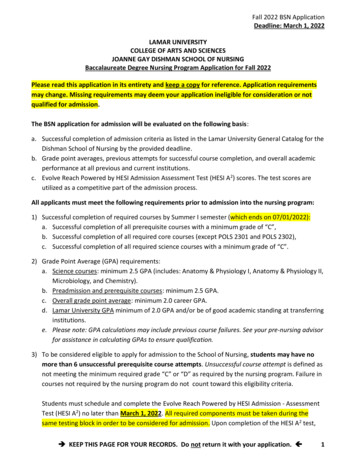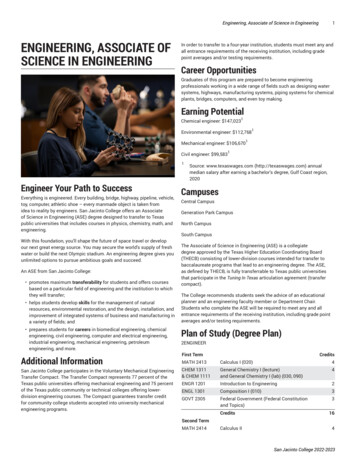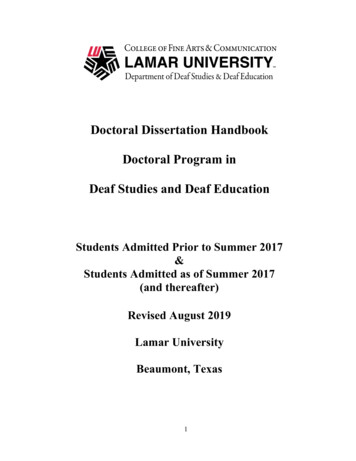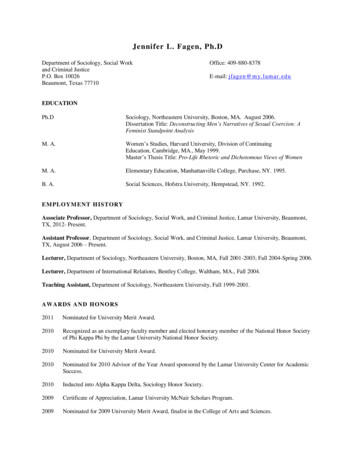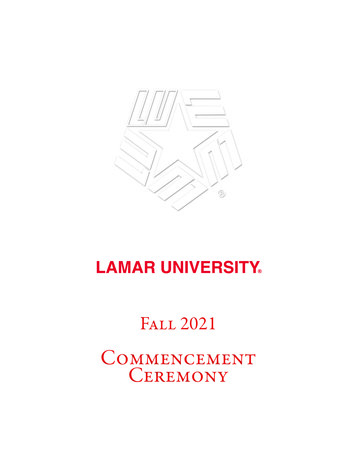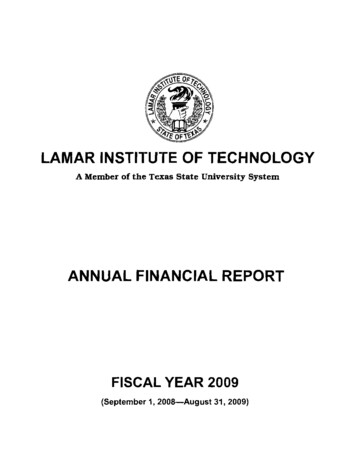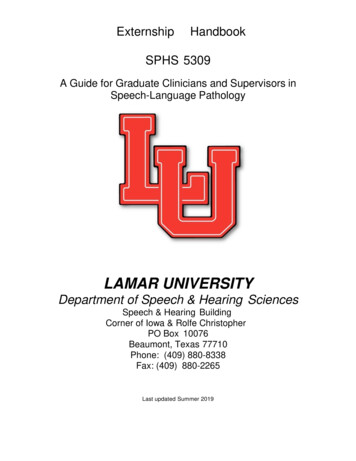
Transcription
ExternshipHandbookSPHS 5309A Guide for Graduate Clinicians and Supervisors inSpeech-Language PathologyLAMAR UNIVERSITYDepartment of Speech & Hearing SciencesSpeech & Hearing BuildingCorner of Iowa & Rolfe ChristopherPO Box 10076Beaumont, Texas 77710Phone: (409) 880-8338Fax: (409) 880-2265Last updated Summer 2019
TABLE OF CONTENTSIntroduction to Externships . 3Problem Solving . 4Clinical Externship Information for Lamar Speech & Hearing Clinic . 5Verification of ASHA Certification/State License . 6Attendance Policy . 7ASHA Standards and Procedures . 8Externship Criteria . 8Externship Objectives . 9-11Clinical Skill Time Frame for Graduate Student Externs .12-13Clinical Skills Competency Grading Scale . 14Clinical Skills Competency Rating Scale Description . 15Feedback Tool Guidelines . 16Site Profile . 17Externship Daily Clock Hour Log . 182
Introduction to ExternshipsThis manual is designed to be used by Graduate Clinicians and Supervisors throughout theexternship processExternships are intended to be a hands-on opportunity for a skilled speech-language pathologist toprovide guidance and feedback to a clinician-in-training and to facilitate the student’s acquisition ofessential clinical skills.Externships are scheduled as one of the last components of the MS-SLP clinical program. Thisclinical assignment must be at least 10 weeks (full time, five days per week, unless otherwisespecified during externship initiation) in length to meet the requirements of the Department of Speech& Hearing Sciences clinical practicum guidelines. However, some hospital/rehabilitation sites require12-week assignments. Students enroll in SPHS 5309 for credit. Arrangements for this externship aremade between Lamar University and the Facility. Students must receive prior approval from theDepartment of Speech and Hearing Sciences to take part in this experience. In addition, a contract isrequired.The objectives for the Extern Experience are: to provide the student with a full-time transition experience between the university environmentand professional employment, to provide the student an opportunity to experience varied approaches and philosophies relatingto the professional practice of Speech-Language Pathology, including diagnostic andrehabilitation clinical practices, to provide the student direct clinical experience in providing evaluation and treatment services, to provide the student the opportunity for professional interaction with speech-languagepathologists, audiologists, and other professionals in related disciplines, and to provide the student the opportunity to experience the administrative structure and operationsof a speech-language program in which client service delivery is the primary mission, whichmay include aspects of the following:Roles and Responsibilities of members of a Rehabilitation Team, Procedures for documentation ofservices, such as: chart notes and/or service delivery reports, Introduction to the financial structure ofhealth-related service delivery, such as: billing and reimbursement issues, Total Quality Management,Outcome Measurement, and/or Consumer Satisfaction.3
PROBLEM SOLVINGWe know that your healthcare externship will be a positive and productive experience. However, ifthere are problems or if a conflict arises please follow these suggestions:Step 1:Discuss the concern with the supervisor or student. A discussion should includeinformation about learning styles and suggestions about the MOST beneficial supervisorystyle for you as a student clinician. Develop a plan to address areas of concern. Goalsshould be established.In general, you should1.2.3.4.Identify the problem in writingWrite down the steps that each of you will take to resolve the problemArrange a follow-up meeting to determine that progress is being madeContact the Lamar University Externship Advisor if you need advice in determining how topresent or resolve the problem.If the concern is not resolved:Step 2:Contact the Lamar University Externship Advisor who will in turn hold a meeting with thesupervisor and the student. The Lamar University Externship Advisor will act as afacilitator.Failure to demonstrate identified competencies may result in:Step 3:1.2.3.An extended placement,Co-supervision by an additional supervisor orPossible removal from the placementASHA Clock hours will not be granted for an Incomplete or a Fail in SPHS 5309!4
CLINICAL EXTERNSHIP INFORMATION FORLAMAR SPEECH & HEARING CLINICNAMEEXTERN FACILITYADDRESS DURING EXTERNSHIPCITY STATE ZIPRESIDENCE PHONE DURING EXTERNSHIP (with area code)E-MailEXTERN DATES toYOUR SUPERVISOR (IF KNOWN)IMPORTANT!!!STUDENTS, TO RECEIVE AN EXTERNSHIP GRADE YOU MUST COMPLETE THE FOLLOWING:1. Daily Clock Hours and/or Semester Clock Hourscopies)p. 19 (makeIN CALIPSOPROGRAM2. Verification of ASHA Certification/State Licensep. 6IN CALIPSOPROGRAM3. Completed Clinical Skills Competency GradesIN CALIPSOPROGRAM4. Site Profile5. Clinician’s Supervisor and Extern Evaluationp. 17p. 16Due: NA – for your personaltracking. All official hours mustbe entered and approved inCalipso.Due: Week 1 – Verify that yoursupervisor has uploadeddocuments to Calipso.Due: Midterm & Final*Ensure all scope of practiceexperience is represented.Due: End of SemesterDue: End of SemesterIN CALIPSOPROGRAM6. Clinical Skill Time Frame Form signed/datedp. 12 OR 13Due: End of SemesterIf you are out of town or out of state, please mail/fax the forms to your Lamar University ExternshipAdvisor.Fax: (409) 880-2265Email: babergeron@lamar.eduMailing Address:Lamar UniversityDepartment of Speech and Hearing Sciencec/o Beth ByersPO Box 10076Beaumont, TX 777105
DUE Week 1VERIFICATION OF ASHA CERTIFICATION & STATE LICENSESupervisors, please upload ASHA and Texas certification and licensure to Calipso (see attached instructions), prior toexternship start date. If unable to do so, please fax to: 409-880-2265.Students, please fill in the information below for each SLP supervisor at the site and fax to: 409-880-2265.Name of Lamar Extern StudentExtern FacilityAddress of FacilityExtern Date(s)Extern Facility e-mailName of all Supervisor(s)ASHA#Phone #6E-Mail Address
ATTENDANCE POLICYSpeech-Language Pathology Graduate Student Clinicians enrolled in SPHS 5309 have an obligationto provide clients with regular and consistent therapy sessions. Consistent attendance andadherence to the schedule provided by site supervisors is also required to enable students to gainappropriate skills across disorders. When students can anticipate that other obligations will causeexcessive absence during a semester, they should consider not registering for clinic that semester.Only emergency illness, unforeseen emergencies such as a car accident, or familybereavement will be considered an excusable absence and a reason for canceling an appointmentwith clients, and/or failing to attend assigned clinical placements. Student clinicians will be requiredto offer make-up sessions for any treatment/diagnostic sessions missed while you were out sick.There is a maximum of two emergency excused absences per semester.The Clinic’s policy requires that Graduate Student Clinicians attend all scheduled appointmentswith clients. There are no unexcused absences allowed. Clinicians must submit a doctor’s note orother appropriate documentation. During each semester, emergency excused absences inexcess of two time per assignment (Lamar Clinic, offsite externship, etc.), will be consideredexcessive and will necessitate an infraction notice resulting in one lower letter grade andpotential corrective action.The Remediation Plan will be one of the following three options:(1)Graduate Student Clinicians who miss one unexcused session, or more than two emergencyexcused sessions within a semester will be required to make up all of the sessions missed inthe current semester if the situation permits. The clinical grade for the semester will be lowered.(2)Graduate Student Clinicians who miss one unexcused session, or more than two emergencyexcused sessions within a semester will perform the make-up sessions during the followingsemester. The clinical grade for the current semester will be an F until the sessions are madeup. Due to the limited availability of practicum assignments and depending uponcircumstances and client availability, Graduate Student Clinicians needing to make upsessions may need to extend their program in order to accumulate the experience and typesof clinical hours required for graduation.(3)Graduate Student Clinicians who miss one unexcused session, or more than two emergencyexcused sessions within a semester may be removed from that particular clinical assignment;in this case no hours will be accrued and the clinician will earn a clinical grade of C or lower.The clinician may withdraw with a “pass” or “fail,” if allowable by the University’s timetable(academic calendar).(4)Graduate Student Clinicians who miss more than five percent of any clinical practicumassignment or are not earning a grade of B or better anytime during a semester may havetheir clinical privileges removed. No hours will be accrued.7
American Speech-Language-Hearing AssociationMembership & Certification HandbookSpeech-Language PathologyStandards & Implementation ProceduresStandard IV-E Clinical Practicum: Supervision must be provided by individuals who hold theCertificate of Clinical Competence in the appropriate area of practice. The amount of supervisionmust be appropriate to the student’s level of knowledge, experience, and competence.Supervision must be sufficient to ensure the welfare of the client/client.Standard IV-C; V-B: Clinical educators/supervisors of clinical experiences must hold current ASHAcertification and state licensure in the appropriate area of practice during the time of supervision. Thesupervised activities must be within the ASHA Scope of Practice in Speech-Language Pathology in orderto count toward the student’s ASHA certification requirementsOnly the supervisor who actually observes the student in a clinical session is permitted toverify the credit given to the student for the clinical practicum hours.Direct supervision must be in real time and must never be less than 25 percent of thestudent’s total contact with each client/client and must take place periodically throughout thepracticum. These are minimum requirements that should be adjusted upward if the student’s level ofknowledge, experience, and competence warrants. A supervisor must keep clinician in line of sight andbe available to consult as appropriate for the client’s/client’s disorder with a student providing clinicalservices as part of the student’s clinical education. Direct supervision must be in real time. Supervisionof clinical practicum must include direct observation, guidance, and feedback to permit the student tomonitor, evaluate, and improve performance and to develop clinical competence.Effective January 1, 2020 - Standard V-E.The supervising SLP must: have an equivalent of a minimum of 9 months of full-time clinical experience (post CF), have completed a minimum of 2 hours of professional development in clinicalinstruction/supervision post CCC status.**Lamar University can provide access to CE opportunities in supervision as needed. Healthcare Externship Student Prerequisites1. B.A. or B.S. in communication disorders or a related field.2. Enrollment in the Lamar University SLP program with a GPA of 3.0 or higher on a 4.0 scale3. Successful completion of an interview with the lead SLP and supervising SLP at the prospected4.5.6.7.8.9.site, if required by the site.Successful completion of clinical practicum in the university clinic.Current immunization record (TB & HEP B testing falls under this category) and CPR certification,as required by the facility.Professional liability insurance coverage (provided by Lamar University).Letters of recommendation along with undergraduate and graduate transcripts, if required by thesite.Successful completion of all portions of writing workshop (goal development, SOAPs,evaluations, etc.).Successful completion of medical terminology quiz (90%).8
EXTERNSHIP OBJECTIVESClinical Objectives for Graduate Student CliniciansObjective I - Professional Conduct:The student will develop outstanding standards of professional conduct.1.2.3.4.5.6.7.8.9.10.11.12.Student abides by professional code of ethics.Student has neat, clean and appropriate appearance.Student shows respect for all members of the rehabilitation team as well as support staff.Student is aware of and follows all departmental policies and procedures.Student demonstrates understanding of the speech pathologist’s role as it relates to otherdisciplines.Student accepts constructive criticism and is aware of his/her own strengths andweaknesses relative to the clinical setting.Student demonstrates curiosity and enthusiasm about his/her profession.Student demonstrates self-discipline and dependability in meeting responsibilities.Student is able to discern and handle appropriately confidential information.Student demonstrates interest in his/her clients.Student demonstrates confidence in his/her clinical skills and promotes feelings of confidencefrom his/her clients and other clinicians.Student is able to respond appropriately to clients’ behavior and seeks assistance whenneeded.Objective II - Communication:The student will develop effective communication skills.1.2.3.4.5.6.7.Student presents ideas logically and clearly to clients, family members, and other healthprofessionals.Student is knowledgeable and uses appropriate terminology to meet specific communicationsituations.Student is able to give easily understood and appropriate instructions to clients and familymembers.Student develops effective rapport with clients, family members and other staff members.Student is able to report progress as well as significant non-clinical information to other staffmembers and medical staff.Student is able to summarize and verbally present diagnostic findings to clients, familymembers and other staff members in a clear, concise manner.Student is able to write clear, concise evaluations, discharge summaries, staffing notes andprogress notes according to department guidelines.Objective III - Diagnostic/Treatment skills:The student will develop outstanding diagnostic/treatment skills.These are general guidelines for all diagnostic/therapeutic situations1.2.3.4.5.6.Student will perform thorough chart review and document relevant information.Student will demonstrate ability to analyze client’s medical, social and psychological history as it relatesto rehabilitation.Student will choose appropriate diagnostic tools.Student will administer the diagnostic tools appropriately, demonstrating sensitivity to the client’sspecific status at time of evaluation.Student will accurately score and interpret the diagnostic results.Student will discern reliability of testing results.9
7.8.9.10.11.12.13.14.15.16.17.18.Student will use informal assessments appropriately.Student will establish a realistic plan of treatment with appropriate long and short -term goals.Student will write functional long and short-term goals.Student will re-evaluate treatment programs and revise them when appropriate.Student will record and maintain objective data for each goal addressed.Student will observe and report non-language behavior, which may affect the client’s progress.Student will demonstrate flexibility/ability to adapt task within a session to meet the client’s needs.Student will provide appropriate feedback/reinforcement to client during the session.Student will involve client and/or family members in treatment when appropriate.Student will analyze effectiveness/ineffectiveness of treatment techniques in a timely and accuratemanner.Student will utilize time effectively.Student will complete the FIM and the Client/Family Education sheet if required by his/her site.These are specific guidelines for dysphagia diagnosis and tudent demonstrates knowledge of the anatomy and physiology of the oral, pharyngeal and upper onethird of the esophageal swallow.Student obtains pertinent information from the client’s chart, which provides diagnostic/prognosticinformation relative to dysphagia.Student accurately performs a bedside dysphagia assessment using the appropriate forms.Student accurately summarizes and reports findings of the bedside evaluation in the medical chart.Student makes appropriate recommendations for dysphagia management and communicatesfindings of the bedside and/or instrumental evaluation to medical staff, other disciplines and theclient/family members.Student performs a modified barium swallow study with 90% independence at the completion ofhis/her externship experience.Student demonstrates ability to prepare the barium in the correct consistencies for each clientspecifically.Student administers the barium and food items in the appropriate order and demonstrates flexibility ofthinking to meet the client’s specific needs.Student analyzes the oral, pharyngeal stage of the swallow with 90% independence and minimal inputfrom the supervising speech pathologist at the completion of his/her externship experience.Student makes observations of the upper one-third of the esophageal stage of swallowing with input fromthe supervising speech pathologist.Student identifies and reports the type of dysphagia, aspiration risk level, presence of penetration andany other diagnostic factors, which cause a client’s diet to be modified from a regular consistency.Student demonstrates knowledge of the effects of normal aging on the swallow and makesdiagnostic/prognostic statements accordingly.Student demonstrates knowledge of specific neurogenic disorders on the swallowing mechanism andmakes diagnostic/prognostic statements accordingly.Student completes the modified barium swallow checklist in a timely manner with minimal input from thesupervising speech pathologist at the completion of his/her externship experience.Student makes appropriate recommendations for diet changes, alternative methods of nutrition,therapeutic intervention and follow-up studies.Student communicates results, recommendations and prognosis to the client, family members, otherdisciplines, and medical staff.Objective IV – Time Management and Knowledge of the clinic’s specific policies andprocedures for practicing speech pathology:The student will develop outstanding time management skills. The student will abide bythe clinic’s policies and procedures.1.2.3.4.Student is familiar with the operation of equipment prior to use in treatment.Student demonstrates safe, accurate use of equipment and supplies.Student maintains a clean and neat work station.Student is knowledgeable and abides by standard precautions as stated in the policy and procedurehandbook.10
5.6.7.8.9.10.11.12.Student is able to effectively schedule clients according to procedure.Student is able to make scheduling adjustments to accommodate unexpected changes.Student assembles all necessary materials prior to initiating treatment/evaluation.Student independently schedules one hour of observation for each discipline during his/her externshipexperience; or student independently schedules to follow a client for an entire day through all aspects ofcare. This objective is dependent upon the nature of the client caseload at the beginning of the student’sexternship.Student manages his/her schedule so that she/he completes the day’s work in an eight-hour time frame.Student completes all documentation in a timely manner and in accordance with the department’sguidelines.Student will maintain a clock hour log with number of hours obtained during the externship experience.This log will be sent to the student’s university and a copy will remain in the student’s file at the site.Student will become proficient in all billing procedures. 11
HEALTHCARE CLINICAL SKILL TIME-FRAMEFOR GRADUATE STUDENT EXTERNSStudent Name: Semester/Year:Skill/ActivityTimeline forAchievement1.2.3.4.5.6.Within 2 weeksWithin 2 weeksWithin 2 weeksWithin 2 weeksWithin 3 weeksWithin 4 onTherapy ObservationsChart ReviewAccurate completion of billing formsSelection of appropriate diagnostic toolsAccurate completion of diagnosis of acuterehabilitation clientAccurate identification of anatomy andphysiology of the oral/pharyngeal swallowAccurate interpretation of training tapes ofvarious types of dysphagiaAccurate completion of evaluation formsAccurate completion of short/long-term goalsReport at team conferenceAccurate completion of daily progress notesIdentification and use of informal diagnostictoolsAppropriate interaction with other disciplinesMaking appropriate referralsIndependent completion of evaluation plan oftreatment, discharge planning andobjective/subjective information gatheringCounsel clients and familyComplete a clinical swallowing evaluationindependentlyPerform a Modified Barium Swallow Study withminimal supervisionWithin 4 weeksWithin 4 weeksWithin 5Within 5Within 4Within 4Within 5weeksweeksweeksweeksweeksWithin 5 weeksWithin 6 weeksWithin 8 weeksWithin 8 weeksWithin 8 weeksWithin 8 weeksApproved:Externship Supervising SLP(s)Approved:Director of Facility/DepartmentApproved:Lamar University Externship Advisor12Date Mastered
EDUCATION CLINICAL SKILL TIME-FRAMEFOR GRADUATE STUDENT EXTERNSStudent Name: Semester/Year:Skill/ActivityTimeline forDateMastered Achievement1.2.3.4.5.Within 2Within 2Within 2Within 2Within 46.7.8.9.10.11.12.13.OrientationTherapy ObservationsStudent File / Child Protection Policy ReviewReview of Evaluation Reports and IEPsDevelopment and Implementation of a TherapyPlanAccurate completion of documentationAccurate completion of short/long-term goalsAttendance in conferences, ARDs, facultymeetingsAppropriate interaction with other disciplinesSelection of appropriate diagnostic toolsAppropriate referralsIndependent completion of evaluation plan oftreatment, discharge planning andobjective/subjective information gatheringEducation of parents and teachersweeksweeksweeksweeksweeksWithin 5 weeksWithin 5 weeksWithin 5 weeksWithin 5 weeksWithin 6 weeksWithin 8 weeksWithin 8 weeksApproved: Externship Supervising SLP(s)Approved: Director of Facility/DepartmentApproved: Lamar University Externship Advisor13
CLINICAL SKILLS & COMPETENCY GRADING SCALEPlease see the attached handbook for utilizing the Calipso online software to track midterm andfinal grades for student clinicians. All grades are posted in Calipso.Prior to the semester begin, supervisors need to: Register and activate a profile Complete site information Upload license & certificationWhile there will be some variation across different competencies based on unequal access to allpopulations, the grading scale below outlines how the average scores on the 1-5 rating scalecorrespond to traditional letter grades. Guidelines for using this 5 point scale are found on page 15 ofthis document.Midterm is an opportunity to assess progress thus far, meet with the student to review expectations, anddetermine whether any additional supports are necessary for optimal skills development. Midtermgrades are due approximately seven or eight weeks into the Fall/Spring semesters. However, weunderstand that, due to fluctuating caseloads, your availability to complete this process may not alwaysbe consistent. Therefore we happily allow for an extra week, if necessary.Grading Scale for Semesters 4 and 5 – Externship:4.8-5.0 A 4.6-4.79 A4.2-4.59 A3.9-4.19 B 3.6-3.89 B3.3-3.59 B3.0-3.29 C 2.7-2.99 C2.4-2.7D1-2.39FIn need of clinical remediationPlease note that the scale above reflects expectations for FINAL grades. A minimum of a B- is requiredto pass a clinical rotation. If you have concerns that a student is operating below the B level at any timein the semester, please contact Ms. Karen Whisenhunt Saar as soon as possible to discuss.14
CLINICAL SKILLS & COMPETENCYPerformance Rating Scale for CalipsoPlease utilize the rating scale below to guide decisions in determining midterm and final grades.Performance Rating Scale1Not evident: Specific direction from supervisor does not alter unsatisfactory performance. Studentrequires direct instruction to modify behavior and is unaware of need to change. Supervisor mustmodel behavior and implement the skill required for client to receive optimal care. Supervisorprovides numerous instructions and frequent modeling. (skill is present less than 25 percent of thetime).2Emerging: Skill is emerging, but is inconsistent or inadequate. Student shows awareness of needto change behavior with supervisor input. Efforts to modify may result in varying degrees ofsuccess. Frequent supervisor feedback, specific instruction, and support is required for all aspectsof case management and services. (skill is present 26-50 percent of the time).3Present: Skill is present and needs further development, refinement, and/or consistency. Studentis aware of need to modify behavior, but does not demonstrate consistent independent ability to doso. Specific supervisor feedback is rarely generalized to other actions or areas of interventionsessions. Supervisor provides on-going monitoring and feedback; focuses on increasing student’scritical thinking on how/when to improve skill. (skill is present 51-75 percent of the time).4Adequate: Skill is developed/implemented most of the time, though in need of some continuedrefinement or consistency. Student demonstrates some independent ability to generalize superiorfeedback to other aspects of intervention. Student is aware and can modify behavior in-session.Student demonstrates ability to self-reflect and evaluate clinical performance. Problem-solving isindependent. Supervisor acts as a collaborator to plan and suggest possible alternatives (skill ispresent 76-90 percent of the time).5Developed: Skill is consistent and well developed. Student can modify own behavior as neededand is an independent problem-solver. Student can maintain skills with other clients, and in othersettings, when appropriate. Demonstrates independent and creative problem solving. Supplementssupervisor feedback with consultation and critical analysis of reliable external sources such asrecent academic literature. Supervisor serves as consultant in areas where student has lessexperience; provides guidance on ideas initiated by student (skill is present more than 90 percent ofthe time).15
Feedback ToolClinician’s Supervisor and Extern Evaluation Completed by StudentCourse SPHS 5309Each student clinician will complete supervisor feedback in Calipso at the end of the semester. Potential items toconsider in feedback process include:1)Establishment and maintenance of an effective working relationship:a) a. Clinical responsibilities and expectations (e.g., lesson plan format, due dates, report format, contract,optional lessonplans as determined by clinician's experience, etc.) were developed jointly and communicatedclearly during the initial supervisory conference.i) Supervisor expectations were modified accordingly as semester progressed.b) Provided enough on-going, objective feedback to satisfy personal needs regarding clinical skills.c) a. Areas of strength were communicated clearly.i) Areas of weakness were communicated clearly.ii) Feasible suggestions/alternatives were provided.d) Jointly evaluated and communicated the effectiveness of the clinician-supervisor relationship.e) Expressed a willingness to integrate feedback suggested by the clinician.f) Encouraged clinician to analyze his/her work to become more independent as the term progressed ,commensurate with the level of experience with designated population.g) Provided opportunities for clinician to communicate suggestions/critiques regarding supervisory process orcontact.2)Assisting in the development and implementation of the therapy program:a)b)c)d)e)3)Developing verbal and written communication skills:a)b)c)d)e)4)d)e)Held sufficient number of conferences with the clinician.Written/verbal evaluation was given to the clinician.Observed sufficient number of sessions based on individual need (e.g., level of experience
Professional liability insurance coverage (provided by Lamar University). 7. Letters of recommendation along with undergraduate and graduate transcripts, if required by the site. 8. Successful completion of all portions of writing workshop (goal development,SOAPs, evaluations, etc.). 9. Successful completion of medical terminology quiz (90%).
